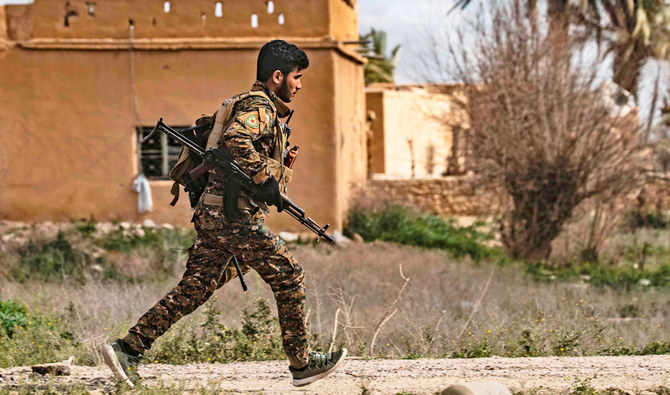ANKARA: A surprise deal between American Delta Crescent Energy LLC oil company and the Syrian Democratic Forces (SDF) on the development of oil fields in northeastern Syria has sparked concerns about the reaction from Ankara.
One of the key disagreements between Turkey and the US on Syria has been about the latter’s local cooperation with the SDF.
But Ankara has reportedly kept silent about this deal and not reacted negatively, according to the Al-Monitor news portal, despite the SDF being considered a terror group and a political extension of the outlawed Kurdistan Workers’ Party (PKK) by Ankara.
The deal was reportedly made “with the acknowledgement and encouragement of the White House” with Republican Senator Lindsey Graham having engaged in talks with SDF leader Mazlum Kobani for the development of oil fields in the region by the American company.
Syria’s oil supply is concentrated on the northeastern part of the country, especially in Qamishli and Deir ez Zor, which are controlled by the Kurdish-led autonomous administration.
The Kurdish-led SDF began withdrawing from Turkish-Syrian border zones last October in accordance with a deal brokered by Russia and Turkey. They were then redeployed to new positions about 30 km from the border in northeast Syria.
On July 10, Kobani met the top commander of US forces in the Middle East, Gen. Frank McKenzie, in northeast Syria to discuss regional issues.
Joe Macaron, a Middle East foreign policy analyst at the Washington-based Arab Center, said that Turkish President Recep Tayyip Erdogan will not jeopardize his good relationship with US President Donald Trump — in arenas from Syria to Libya — for an inevitable US oil contract in SDF-controlled areas in Syria when he knows how important oil is for Trump.
FASTFACT
Syria’s oil supply is concentrated on the northeastern part of the country, especially in Qamishli and Deir ez Zor, which are controlled by the Kurdish-led autonomous administration.
“Ankara has made clear strategic gains in Syria and Libya thanks to US support and has managed to push Kurdish forces away from its border while altering the dynamics in Libya and the Eastern Mediterranean,” he told Arab News.
However, Macaron thinks that Erdogan can always bring up the issue at a later stage if the Trump administration shifts policy in Syria or if Trump loses the election. Not reacting now does not mean that Ankara will not make an issue of it in the future.
“This is an official deal between the company and the SDF. The Americans have a plan for this area but we don’t know any detail about the contract. It is the reason why Ankara did not react strongly as the deal is not clear,” Navvar Saban, a military analyst from the Istanbul-based Omran Center for Strategic Studies, told Arab News.
According to Saban, the vision of the US about the region and on the oil issue had changed in favor of long-term investments.
Nicholas A. Heras, Middle East security program manager at the Washington-based Institute for the Study of War, thinks the deal is more important to the SDF than it is to the Americans, which is probably why Ankara has not reacted strongly.
“The SDF needs to continue to build ties with the United States, and this oil deal strengthens the ties between the SDF and the US,” he told Arab News.
According to Heras, Ankara seems to be calculating that because Syrian oil reserves are not large, and this deal is relatively small, if the Turks wanted to pursue further military action in northeast Syria this deal would not cause Washington to stop them.
Ruwan Al-Rejoleh, an independent analyst in Washington, DC, relates this deal with attempts by the US to facilitate intra Kurdish talks and Kurdish-Turkish indirect talks on the Syrian front to reach a settlement for groups in northeast Syria before the US withdrawal.
“President Erdogan offered Russia and US a proposal to use the oil revenues in Syria for reconstruction purposes that can be overseen through an international body but not in any way accepting or allowing the oil revenues to strengthen the local authority of SDF in northeastern Syria,” she told Arab News.
Noting that James Jeffery, special US representative for Syria engagement, had reportedly informed Turkey about the oil deal and that Ankara had not reacted negatively, Al-Rejoleh thinks that there is a certain level of understanding between Washington and Ankara about the deal.
“The devil is in the detail; it is important to look at the fields that are included in the deal as well as Russia’s position. Russia didn’t express a position yet, however. Moscow is keen on the balancing act in a way to ensure that Syrians who live outside the SDF-led area will get their share from the oil revenue,” she said.
But, according to Al-Rejoleh, this deal doesn’t seem designed to empower the local governance authority of the SDF but rather to create an international understanding and platform, where a political deal can be reached through a shared economic platform of the oil revenues among local and international actors.


























